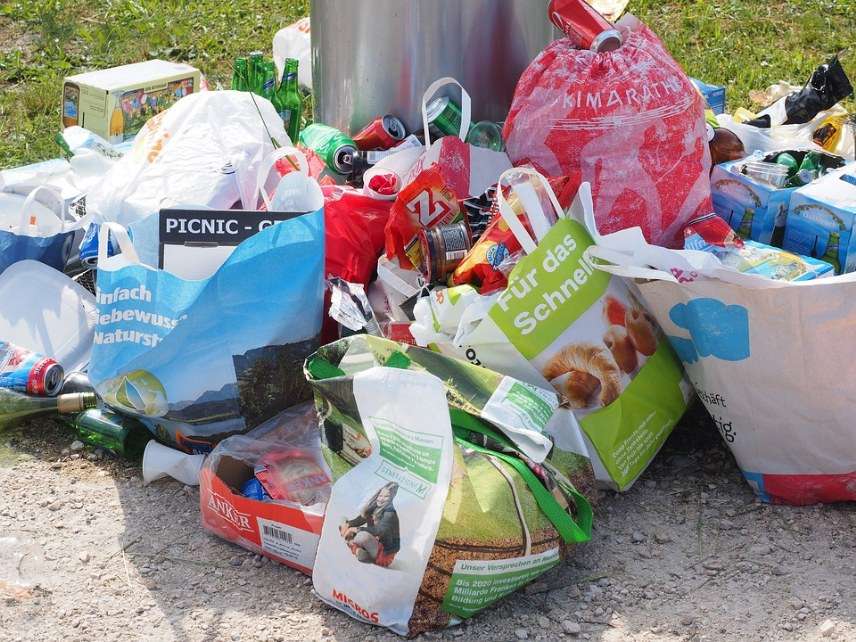To Reduce Food Waste, Government Must Get Out of the Way
Efforts to combat the problem continue to bump up against idiotic and outrageous laws.

Waste may soon meet its match. No, not government waste. That's still fashionable.
Rather, I'm talking about food waste, which the Organisation for Economic Co-operation and Development (OECD) defines as "food that completes the food supply chain up to a final product, of good quality and fit for consumption, but still does not get consumed because it is discarded, whether or not after it is left to spoil."
The issue of food waste, which was barely on the radar of most journalists, policymakers, and eaters only a decade or so ago, has become a globally recognized problem. Forbes, for example, declared "zero-waste markets" a key element of 2017's top food trends.
The data on food waste, which I discuss at length in my recent book, Biting the Hands that Feed Us: How Fewer, Smarter Laws Would Make Our Food System More Sustainable, are stark. Americans waste nearly 40 percent of all food, or 133 billion pounds each year. Forty million tons of that food waste ends up in our landfills annually. Put in economic terms, Americans waste $165 billion worth of food every year, or ten percent of the money we spend on food.
But the impact of food waste isn't merely economic.
"Consider, for example, the water, land, pesticides, fuel, and labor that were used to produce and dispose of food that wasn't eaten," I wrote earlier this year. "The uneaten food typically ends up belching methane—a potent greenhouse gas—in fields or landfills. Food that goes to waste also can't be used to combat hunger."
In response to this data, local, state, national, and international efforts to combat food waste have exploded recently. In 2015, for example, the USDA and EPA pledged to halve domestic food waste by 2030. And a new Kentucky law enhances protections for those who donate food that would otherwise go to waste.
Corporate and nonprofit efforts to fight food waste are also growing. For example, some food companies are using food—including some that might have gone to waste—to create food packaging. And scientists have developed genetically modified apples that don't brown immediately after they're sliced, which makes them less likely to go to waste.
A new report released this month by Harvard Law School's Food Law & Policy Clinic, Opportunities to Reduce Food Waste in the 2018 Farm Bill, proposes—as its title suggests—several ways that Congress can help reduce food waste. Among the report's suggestions is that Congress authorize a study to look at ways that USDA produce-grading rules promote food waste.
As the recommendations indicates, law and regulations are a key ingredient in perpetuating our food-waste mess.
"[H]idden behind many of these government campaigns to reduce food waste is the frequent cause of that food waste: other government regulations," I wrote last year. "Much of our wasted food isn't due to the excesses or carelessness of individuals and food companies. Rather, it's often caused by idiotic and outrageous rules that force us to waste food."
In Oakland, in an example I discuss in Biting the Hands that Feed Us, the city signed a waste contract that effectively forced restaurants that had been composting their food waste voluntarily to throw it away instead.
A more recent—and even more outrageous—example of rules run amok comes from England. There, the founder of a charity that collects fruits and vegetables and other foods that are approaching their use-by dates and sells them at pay-what-you-can prices faces up to two months in prison and a steep fine for storing food past its expiration date.
Adam Smith, the aptly named benevolent founder of the Real Junk Food Project, apparently ran afoul of the country's Police and Criminal Evidence Act and its Food Safety and Hygiene Regulations.
Smith says the charity has fed over a million people without hearing any complaints of foodborne illness. The average food inspectors flagged in the warehouse of the Real Junk Food Project, which was founded three years ago to combat both food waste and hunger, was just two weeks past its expiration date.
Charitable and private efforts to combat food waste continue to bump up against idiotic and outrageous rules like these. I believe we can solve the problem of food waste, but only if lawmakers get out of the way.


Show Comments (93)